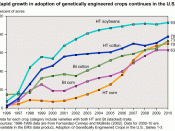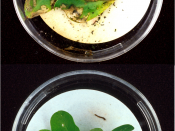Genetic engineering, a scientific breakthrough involving the manipulation of DNA to identify a desired gene and the insertion of the desired gene into the cell of a living organism to produce a desired outcome (i.e. obtaining a gene for disease resistance from one plant and inserting it in another), has been a controversial issue for years since its beginnings in the 1980s. Many of the criticisms against this new technology are aimed at genetic engineering in agriculture. Agricultural biotechnology/genetic engineering is best known for its products, which are transgenic crops and genetically modified foods. Genetic engineering has enabled farmers and other agricultural industries to produce enhanced crops and goods that would benefit consumers both immediately and in the long run. Although genetic engineering has high potential in solving many agricultural-related issues, critics say that this technology also has the potential to have dangerous effects that may not be distinguishable now but can be significantly extensive in the future.
In modern agricultural biotechnology, scientists are now able to accurately target specific genes in one plant or other living organism and insert it in another plant by either using bacteria/bacteriophages or by gene guns. Proponents of agricultural genetic engineering believe that genetic engineering is simply an extension of Mendelian genetics and crossbreeding; that is, gene modification is just a quicker way of obtaining and producing a desired trait rather than waiting for countless generations of breeding. With genetic engineering, producers can increase productivity and reduce crop failure by obtaining the gene known for contributing to the longevity of one plant and inserting it in another plant (Whitman). Agricultural biotechnologists can also create plants that are resistant to disease, insects, and weeds through genetic engineering using these techniques. If more plants that are resistant to these irritants, supporters argue, there is less of...


